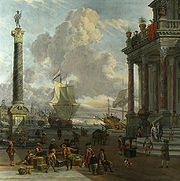- Single market
-
"Common market" redirects here. For the European Common Market, see European Economic Community. For the hip-hop group, see Common Market (band).Trade barriers
Tariffs · Non-tariff barriers
Import quotas · Tariff-rate quotas
Quota share · Import licenses
Customs duties · Export subsidies
Technical barriers · Bribery
Exchange rate controls · Embargo
Safeguards
Countervailing duties
Anti-dumping duties
Voluntary export restraintsOrganizationsWorld Trade Organization
World Customs Organization
International Monetary Fund
Preferential trading area
Free trade area · Customs union
Single market · Economic union
Monetary union · Fiscal union
Customs and monetary union
Economic and monetary unionBy CountryA single market is a type of trade bloc which is composed of a free trade area (for goods) with common policies on product regulation, and freedom of movement of the factors of production (capital and labour) and of enterprise and services. The goal is that the movement of capital, labour, goods, and services between the members is as easy as within them.[1] The physical (borders), technical (standards) and fiscal (taxes) barriers among the member states are removed to the maximum extent possible. These barriers obstruct the freedom of movement of the four factors of production.
A common market is a first stage towards a single market, and may be limited initially to a free trade area with relatively free movement of capital and of services, but not so advanced in reduction of the rest of the trade barriers.
The European Economic Community was the first example of a both common and single market, but it was an economic union since it had additionally a customs union.
Contents
Benefits and costs
 Stages of economic integration around the World:
Stages of economic integration around the World:
(each country colored according to the most advanced agreement that it participates into.)Economic union (CSME, EU)A single market has many benefits. With full freedom of movement for all the factors of production between the member countries, the factors of production become more efficiently allocated, further increasing productivity.
For both business within the market and consumers, a single market is a very competitive environment, making the existence of monopolies more difficult. This means that inefficient companies will suffer a loss of market share and may have to close down. However, efficient firms can benefit from economies of scale, increased competitiveness and lower costs, as well as expect profitability to be a result. Consumers are benefited by the single market in the sense that the competitive environment brings them cheaper products, more efficient providers of products and also increased choice of products. What is more, businesses in competition will innovate to create new products; another benefit for consumers.
Transition to a single market can have short term negative impact on some sectors of a national economy due to increased international competition. Enterprises that previously enjoyed national market protection and national subsidy (and could therefore continue in business despite falling short of international performance benchmarks) may struggle to survive against their more efficient peers, even for its traditional markets. Ultimately, if the enterprise fails to improve its organization and methods, it will fail. The consequence may be unemployment or migration.[citation needed]
List of single markets
Every Economic union and Economic and monetary union has also a Common market
- Canada – Agreement on Internal Trade (AIT)
- European Free Trade Association (EFTA)
- European Economic Area (EEA)
- Switzerland – European Union[2]
Additionally the autonomous and dependent territories, such as some of the EU member state special territories, are sometimes treated as separate customs territory from their mainland state or have varying arrangements of formal or de-facto customs union, common market and currency union (or combinations thereof) with the mainland and in regards to third countries trough the trade pacts signed by the mainland state.[3]
Proposed
- 2012 Common Economic Space of the Commonwealth of Independent States, Eurasian Economic Community or the Customs Union of Belarus, Kazakhstan and Russia[4]
- 2015 ASEAN Economic Community (AEC)
- East African Community (EAC)[5]
See also
References
- ^ International Trade Theory and Policy
- ^ Initial FTA enforced 1 January 1973 WT/REG94/R/B/1
- ^ EU Overseas countries and some other territories participate partially in the EU single market per part four of the Treaty Establishing the European Community; Some EU Outermost regions and other territories use the Euro of the currency union, others are part of the customs union; some participate in both unions and some in neither.
Territories of the United States, Australian External Territories and Realm of New Zealand territories share the currency and mostly also the market of their respective mainland state, but are generally not part of its customs territory. - ^ Russia expects CIS countries to create free trade area
- ^ Member states will have to make several changes to their national laws to allow full implementation of the common market in areas such as immigration, labour and customs.
External links
Stages of economic integration Preferential trading area | Free trade area · Monetary union | Customs union · Common market | Customs and monetary union · Economic union | Economic and monetary union · Fiscal union | Complete economic integrationCategories:
Wikimedia Foundation. 2010.

